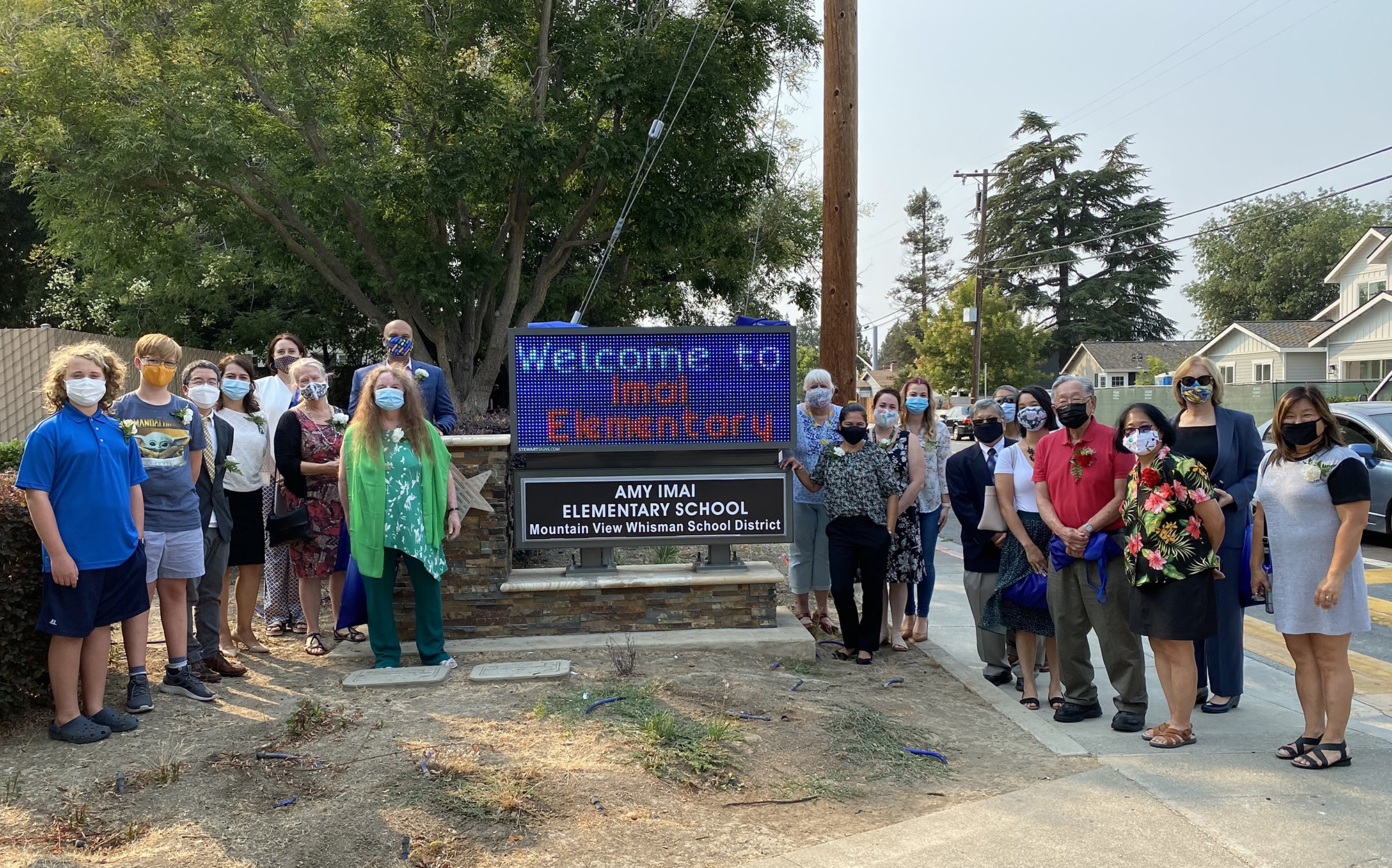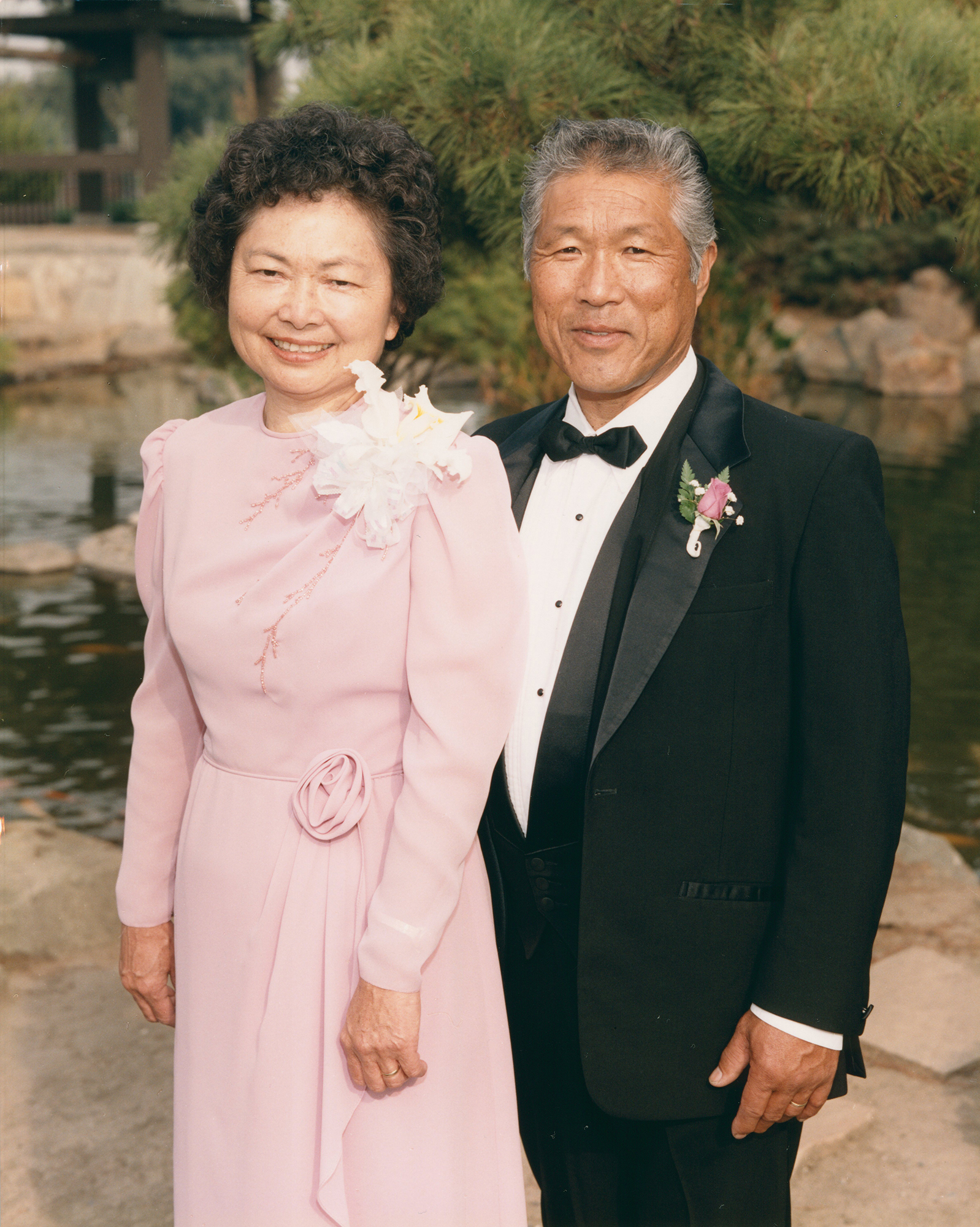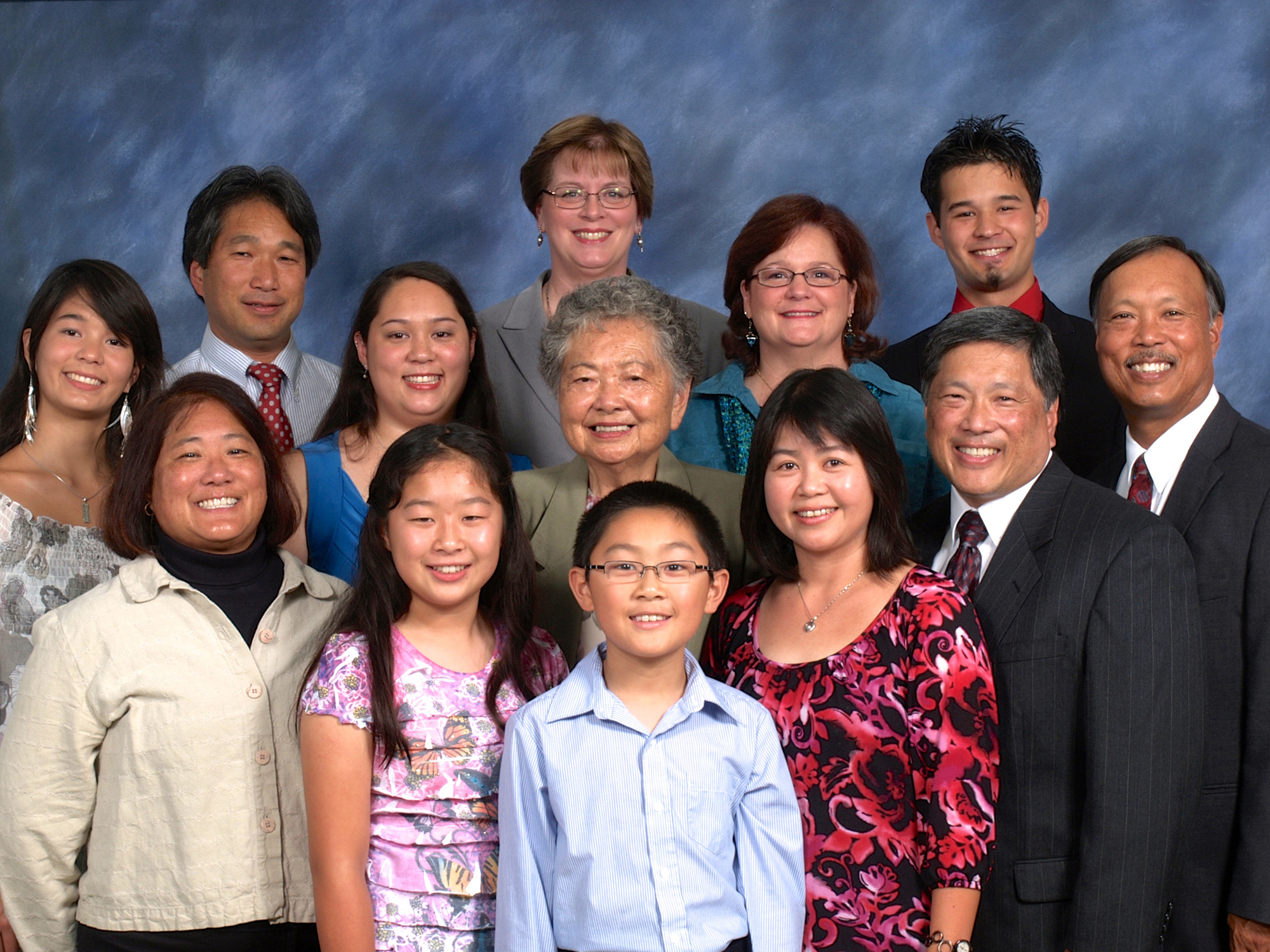Amy Imai spent a lifetime sharing her experiences as a Japanese American interned during World War II in the hope that the past would never be repeated. Now Mountain View students are attending an elementary school named in her honor.
The Mountain View Whisman School District Board of Trustees voted unanimously earlier this year to rename Frank L. Huff Elementary School once it came to light that Huff, a local education leader in the early 1900s, espoused racist and anti-immigrant views.
Imai, a decades-long Mountain View resident, was picked as the school's new namesake after a wide-ranging search process that included national figures like the late U.S. Supreme Court Justice Ruth Bader Ginsburg. The district held a renaming ceremony last month.
Born in 1930, Imai lived in Mountain View with her family until they were forced to relocate to an internment camp during World War II. Once released, Imai returned to the Bay Area and ultimately settled again in Mountain View.
Before her death on New Year's Eve in 2013, Imai was deeply involved in the Mountain View Buddhist Temple for decades, supported Mountain View's sister cities program, played a role in local politics and spoke at local schools about her time in the internment camp.
"She had a huge impact in her community, but in some ways it was a quiet impact," said school board President Devon Conley. "It was steadfast, it was persistent."
A local leader
Imai was the second oldest of four children. Her younger brother Arthur Kunimoto, the only surviving sibling, remembers their family living on Eunice Avenue, just a few blocks from the school now named after his sister.
After the attack on Pearl Harbor, the family was sent to the Heart Mountain War Relocation Center in Wyoming, where roughly 14,000 people were confined over a three-year period. It made no difference that her father was a World War I veteran.
In her last year of incarceration, Imai worked as a cook and food server in the camp's hospital, according to an article and oral history interview with Imai from the Japanese American Museum of San Jose.
Once the family was released and allowed to return to California, Kunimoto said he remembers feeling animosity from some in the community and finding businesses that refused to serve Japanese Americans.
"It was not easy to get a haircut," Kunimoto said with a slight chuckle.
The family worked as sharecroppers in the Cupertino area, picking berries, Kunimoto said. Amy helped take care of the siblings, acting in many ways as a second mother, he said.
Imai graduated from Fremont High School in Sunnyvale and was one of the graduation speakers, according to her obituary.
Kunimoto said his sister got a scholarship to San Jose State, but didn't end up attending because their father opposed her going to college.
In 1957, she married Robert Imai, who had a carnation farm in Mountain View. The couple sold the flowers and raised four children who attended local schools, including Slater, Graham and Mountain View High School, said Leslie Imai, Amy Imai's daughter-in-law.
For many decades, Imai was active in the Mountain View Buddhist Temple, including serving as a Dharma School teacher for over 45 years and helping to coordinate funeral receptions.
Speaking out
Imai was also known for consistently speaking out about her experiences being interned. She would go to schools, libraries and other community gathering places to talk about her own history.
"It was really important for her to educate people on what happened to her," Leslie Imai said. "She wasn't angry, she just wanted people to be aware and not forget, so it wouldn't happen again."
Mountain View City Councilmember Margaret Abe-Koga remembers her own daughters listening to Imai speak at the Buddhist temple. Listening to a first-person perspective of internment was eye-opening, Abe-Koga said, especially because it is a chapter of American history frequently glossed over in school.
Imai also took an interest in local politics, running unsuccessfully for the Mountain View Los Altos Union High School District Board of Trustees in 1981, according to historical records from the county registrar of voters.
"Politically, she would have done well, but she was born at the wrong time," Kunimoto said.
Despite her own loss, Imai worked to help other local Asian American candidates. That included Abe-Koga herself. After moving to Mountain View in the late 1990s, Abe-Koga said she was introduced to Imai, who helped her get more involved in the community and was an early supporter when Abe-Koga decided to run for City Council.
"She really took me under her wing when I came to Mountain View," said Abe-Koga, who grew up in San Mateo and considers Imai a mentor.
When school board members asked Abe-Koga for suggestions of new namesakes, she said that Imai instantly came to mind. Imai was a particularly timely choice, Abe-Koga said, because of the recent rise in anti-Asian hate incidents.
Imai's niece Lisa Sato, Arthur Kunimoto's daughter, reflected on the recent spike in anti-Asian sentiment and violence, saying that she appreciated the school district taking a stand in its renaming choice.
Sato didn't come to truly know her aunt until she moved to the Bay Area as an adult. Once she did, Sato said she came to appreciate the impact Imai had on both her family and the broader community, calling her a "natural leader."
"Watching how she would reach out to people and make connections was just absolutely incredible," Sato said.
When Imai died at the end of 2013 at age 83, Sato said she realized just how highly regarded her aunt was when hundreds of people showed up for her funeral, which she said was broadcast on closed circuit TV because so many came to pay their respects. According to Leslie Imai, over 700 people attended.
Imai was a "legend" in the family, known for not being judgemental and treating people with respect, said Sato.
"Whenever I think about taking the higher road, I think about Amy," she said.
Acknowledging past wrongs
By naming a school in Imai's honor and discussing Mountain View's history with immigrant populations, Conley said the community is "closing the circle of justice" and trying to rectify some of its former wrongs.
"She wanted to make sure that what happened to her and her family did not happen in the future," Conley said. "That's a really powerful legacy. What an incredible example for our children."
Leslie Imai said she was honored to find out that her mother-in-law's contributions would be commemorated.
"To have an Asian American woman nominated for something like this, especially given who Frank Huff was and his bias specifically towards Asian Americans, it was very fitting," she said.
Evidence of Huff's racist views include a historical account from 1922 that said Huff "sincerely believes in America for Americans, and is strongly opposed to the immigration into our country of people who are out of harmony with American institutions and ideals, particularly those of such blood as cannot be assimilated by the Caucasian race to its benefit."
The school's new name will give students an opportunity to learn more about the history of Japanese internment, Conley said, adding that symbols are important and "carry a weight in the hearts and minds of our children and families that we can't underestimate."
In recent years, multiple Bay Area districts have scrapped school namesakes for having racist or otherwise offensive views. That includes the Palo Alto Unified School District, which renamed two schools in 2018 because the former namesakes, Lewis Terman and David Starr Jordan, were outspoken supporters of eugenics.
At times, school renaming has gotten controversial. The San Francisco Board of Education earlier this year suspended a plan that came under heavy criticism to rename 44 schools.
Conley said she knows some object to removing the names of offensive historical figures, but said she believes "we can teach our students about our history and also create justice in the world by lifting up symbols who represent who we want to be as a community."





Comments
Registered user
Martens-Carmelita
on Sep 14, 2021 at 2:32 pm
Registered user
on Sep 14, 2021 at 2:32 pm
Ms. Imai would surely be ashamed to have this site named after her. The perimeter of the school is strewn with trash - much of which was left behind by careless contractors working there over the summer. A really poor example of how to teach our children to respect and care for our environment.
Registered user
Old Mountain View
on Sep 14, 2021 at 4:51 pm
Registered user
on Sep 14, 2021 at 4:51 pm
I applaud this decision. Japanese Americans been an integral part of Mountain View's populace since the early agricultural days. They are certainly an important part of our community in 2020 as well.
Honestly, I think every school named after an individual should be renamed ever 20-30 years for someone who has recently passed away. There are certainly more locals, like Mrs. Imai, who deserve to be honored in this way than there are schools.
Registered user
Monta Loma
on Sep 14, 2021 at 6:43 pm
Registered user
on Sep 14, 2021 at 6:43 pm
As a good friend of Amy, I'm delighted that her name replaces Frank Huff's. She would be pleased especially because that way her desire that her story will persist beyond her life. (And the trash can and should be removed from around the perimeter of the school). I wish I had known when the renaming event was happening so I could have attended. Sadly, I was out of town for her Celebration of Life. People like Amy make Mountain View a special place.